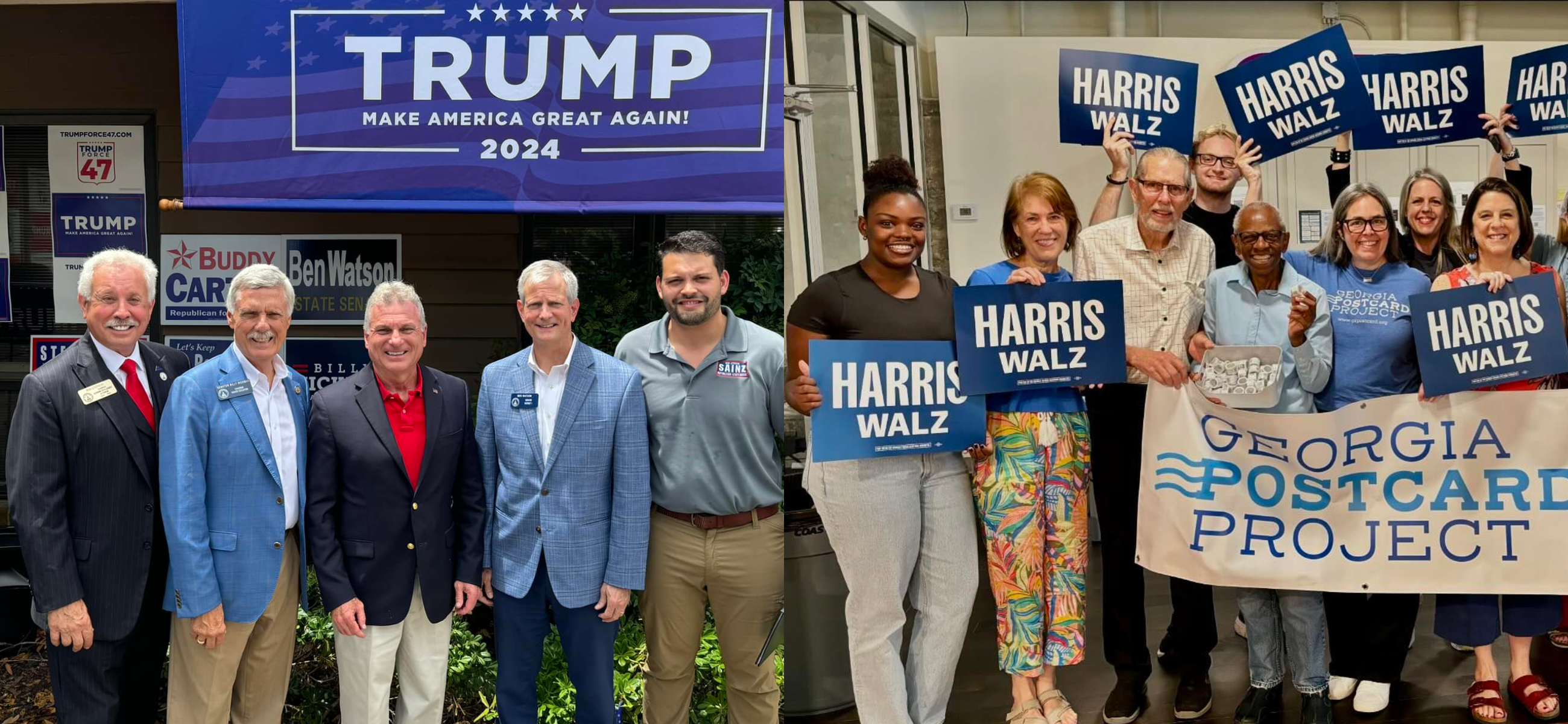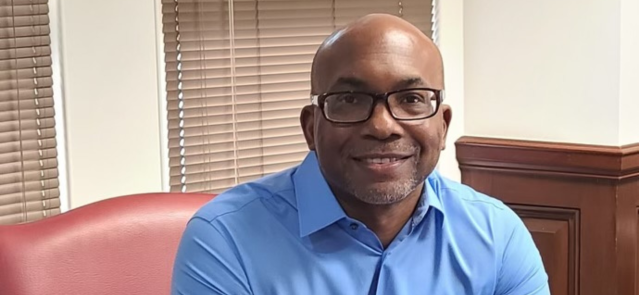Stay ahead of the curve as a political insider with deep policy analysis, daily briefings and policy-shaping tools.
Request a DemoPresidential race aside, what’s at stake for Georgians in the November election?

Trump supporters, left, and Harris supporters. (Credit: Billy Hickman; Georgia Postcard Project)
- Expect more voters, which could help down-ballot candidates
- Redistricting could be an unknown wrinkle in the election
- Republicans should keep their majority hold but Democrats could narrow GOP lead
The Gist
Despite all 236 members of the state House and Senate up for reelection in November, the presidential race has taken center stage in Georgia with the nomination of Vice President Kamala Harris for U.S. president.
Nonetheless, Georgia Democrats will be in a push-and-pull contest to gain more seats in both the House and Senate while Republicans stay focused on maintaining their solid control of state government. Republicans hold the governor, attorney general and secretary of state seats as well as both legislative chambers. The House could be particularly vulnerable.
“Democrats might actually get Republicans knocked down to below 100 seats in the House, which would be the first time since 2005,” University of Georgia political science professor Charles Bullock III told State Affairs.
What’s happening
This election cycle in Georgia is less consequential, because it’s focused mostly on congressional, state House, state Senate and other local elected officials, political analyst Bill Crane told State Affairs. “It’s just a much smaller pool, shorter ballot,” said Crane.
“Below the presidency, it’s marginal changes. A few things will move around in the state Legislature and in some counties,” University of Georgia political science professor Charles Bullock told State Affairs.
“Whoever wins the presidency has tremendous power … but not as much as, say, your county commission does.They determine when your street gets paved or your garbage gets picked up, or what your water bills are,” Bullock added.
Why it matters
Vice President Kamala Harris’ surprise entry into the presidential race in July is predicted to draw more voters — which could help candidates in down-ballot races, experts say.
All 180 state House and 56 Senate seats are up for election this year. Most incumbents prevailed in the May primary.
In January when the Legislature reconvenes, both chambers will be seeking to fill vacancies left by minority leaders Sen. Gloria Butler, D-Stone Mountain, and Rep. James Beverly, D-Macon. Both of their terms end in December.
Republicans will be looking to hold onto control of both chambers.
With two years left in office, Gov. Brian Kemp’s top priority will be expanding the Republican majority in both chambers, Crane said. That includes solidifying some vulnerable suburban incumbents and netting several new seats in exurbs and northern suburbs.
“To do that, they’ve got to take some of those purple, ex-urban and suburban districts that flipped blue and flip them back. They’ve also got to hold onto vulnerable seats,” Crane said.
Georgians First Leadership Committee, Kemp’s Political Action Committee, will boost four incumbents in tough reelection battles: state Reps. Scott Hilton of Peachtree Corners, Matt Reeves of Sugar Hill, Deborah Silcox of Sandy Springs and Ken Vance of Milledgeville, Crane said.
Georgia Democrats, meanwhile, have a chance to pick up a few seats in the House and one in the Senate, chipping away at Republican control.
One House seat that appears vulnerable, Bullock said, is the 56th District held by state Rep. Mesha Mainor, who defected to the Republican Party in July 2023. Mainor faces Democratic challenger Bryce Berry, a public school teacher and community organizer for the heavily Democratic district.
The role of redistricting
Redistricting is likely to impact some incumbents in newly redrawn districts.
“I don’t think there’s any real vulnerable incumbents but there are some suburban areas like Dunwoody, Sandy Springs, North Augusta… incumbents with some seniority that, because of the new maps, don’t have the exact same district they had before,” Crane said. “I wouldn’t say they’re vulnerable but because they’re not established in some parts of the [new] maps, particularly on the Senate side, there’s opportunity.”
Political consultant Pat Pullar told State Affairs the November election is a big opportunity to make some substantial changes in Georgia.
“There’s so much at stake,” said Pullar, who was one of 108 Georgia delegates at the recent Democratic National Convention.“If we start leveraging the power that we have from the top and take it all the way down to the bottom, all of those state reps, all of those members of Congress, all of those county commissioners are going to be on that ballot and we can actually change the trajectory of how this state operates.”
What’s next
In November, voters will also be deciding two constitutional amendments and a statewide referendum question. The three measures slated to be on the Nov. 5 ballot include:
- Create a statewide tax court (constitutional). House Resolution 508 provides the Georgia Tax Court with judicial power and statewide jurisdiction.
- Provide for local option homestead property tax exemption (constitutional). HR 1022 provides for a local option homestead property tax exemption.
- Should tangible personal property tax exemption be increased? (referendum). House Bill 808 would raise the amount of tangible personal property tax exemption to $20,000, from $7,500.
Want to get up to speed for this election? Check out State Affairs’ voters guide here.
Have questions, comments or tips? Contact Tammy Joyner on X @lvjoyner or at [email protected].
Newly minted Senate Minority Leader Harold Jones II: ‘I’m not the typical back-slapping politician’
Nearly 10 years into legislative life, Sen. Harold Jones II wouldn’t change anything about the experience. “I love every minute of it. Even when I hate it, I love it,” the 55-year-old Augusta Democrat told State Affairs. Come January, Jones will add another role to his legislative duties: Senate minority leader, a job held for …
Gov. Kemp calls on state agencies to be fiscally restrained amid record $16.5B surplus
The Gist Gov. Brian Kemp asked the state’s 51 government agencies for continued fiscal restraint when drafting their amended fiscal year 2025 and 2026 budgets. Most agencies adhered to his request even as the state’s general fund surplus hit a record $16.5 billion last month. Forty-five agencies, excluding state courts, followed the governor’s instructions to …
Georgia defies bomb threats as election chief declares a “free, fair and fast” vote amid record turnout
ATLANTA – Despite dealing with over 60 bomb threats, Georgia’s election chief said Tuesday the state’s general election went smoothly. Georgia had a record turnout with nearly 5.3 million people voting, Secretary of State Brad Raffensperger told reporters. Election officials in the state’s 159 counties have until 5 p.m. to certify votes. “We had a …
In the (state)house: Meet the newest members of the Georgia legislature
When lawmakers reconvene at the state Capitol on Jan. 13, there’ll be a cadre of new faces in the 236-member Georgia General Assembly, one of the nation’s largest state legislatures. All 236 statehouse seats were up for election this year. Most candidates ran unopposed. Incumbents in contested races easily kept their seats, with the exception …




